Clayton Lessor's Blog, page 8
October 17, 2017
“Shame”-A Bad Five Letter Word

Your adolescent son shouldn’t feel shame. Sadly he most likely does. How does this happen and why would he feel shame?
In a recent interview I was asked this question “why are boys in trouble?” One of many reasons is they carry shame. The interviewer was shocked and went on to ask, “How can a young boy feel shame about something that wasn’t/isn’t his fault?” It was a profound moment for him (the interviewer) which leads me to believe that you may not realize your son is, or could be, feeling shame.
First, so that I’m clear, he shouldn’t ever have to feel shame over things he has no control over. He does have control over his bad behavior so that’s an exception!
A Bit About Troubled Boys
Boys need a mother and a father.
The attachment theory developed by Dr. Bowlby states that mothers are more important than fathers in a boy’s development “up to puberty.” This is not only what, but why the divorce courts use this in custody cases. Many dads struggle with this, but research supports the theory.
Now, this all changes with boys reaching 11+ years of age and the statistics spell this out.
Erikson’s Psychosocial theory takes over, boys at this age start to look towards dad more intensely and at the man he(dad) is if present. The theory, stage five of development, states that this is the time of Identity vs Confusion. It is considered a crisis if left unresolved and remains a crisis until negotiated and healed. If dad (for whatever reason) doesn’t engage and participate with his son, his son will feel it’s because he isn’t good enough or important enough to his dad; this is a major cause for a young boy to feel shame.
It can take a lifetime for many boys and young men to get to the source of why they feel or felt shame. Consider all the data and stats on the fatherless and absent fathers in the life of men and we see a real crisis and why boys are in trouble and why so many feel shame.
Common Mistakes
You or someone else tells your son that athletic ability has nothing to do with being a man. That statement shames a lot of boys who put stock in their physical ability. Athletic ability is a physical developmental gift which, in some males, are more pronounced, and they either accept or reject as their gift.
Your son is playing on a playground where other boys are and he’s called a sissy. He will feel and carry shame and you may not even be aware it happened. Boys on the playground under the age of 13 should not be unsupervised; this is just one of many reasons why. If this would happen, a healthy male father would protect these boys and explain it is not appropriate.
Black-and-white statements are dangerous. Judgment calls of absolutism can lead to “don’t be” messages. These are shaming and lead to self-doubt and potential depression. We live our lives in that area between black and white, in what is essentially a grey area.
Are you cautious with your words; do you know how harmful they can be?
Author information
 Clayton Lessor
Clayton LessorClayton Lessor, PhD in education and counseling, is a Licensed Professional Counselor in private practice. He is author of “Saving Our Sons: A Parent's Guide to Preparing Boys for Success." Clay has seen over 2000 boys since 2000 and facilitated over 300 Quest Project groups. Boys attend a 10-week "boys to men program" where they and their parents will learn the tools needed to get through these turbulent teen years.
| Twitter | Facebook |
The post “Shame”-A Bad Five Letter Word appeared first on Clayton Lessor.
October 10, 2017
Homework Versus Video Games
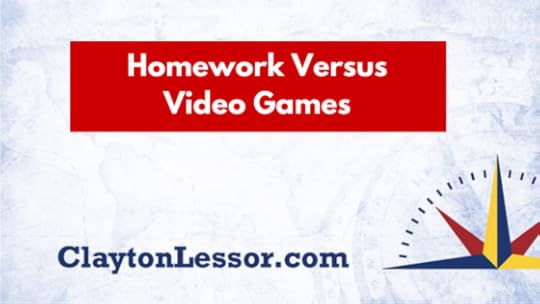
Do you get excuses from your son on why his homework and/or his chores didn’t get done? I have some suggestions that may help.
“Just a Minute!”
My guess is you hear “I will, just a minute” a lot! Based on my experience with the boys I see, homework and chores are not his priority, video games and texting with friends are. Parent’s repeatedly say, “I’ve tried everything” and are at their wits end. We know doing homework is not an option; and having chores teaches responsibility so here’s my suggestions.
Natural consequences! Yes, I’m saying it again, establish natural consequences!
If he doesn’t follow the rules you have established, then his choice leads to a natural consequence you have determined in advance. It also means you have talked about it and been very clear “if you don’t do this, you’re choosing not to get what you want.” Remember, you’re encouraging good behavior and discouraging bad behavior. This method can be, and should be, used for any challenging behavior you are trying to change.
The Discipline
Basically both of you want something. You need him to get his homework done and the dog fed before he plays on his X-Box. Your son on the other hand, wants to play games first and get to the dog and homework later! Let me give you an example here of how a conversation should go.
“Son, I know you can’t wait to play your game, but the rule is, homework gets done and Rover gets fed first. So as soon as you’re finished, you are free to play videos, watch T.V. or talk on the phone.”
Homework is given at every level of school, K-12 these days in order to establish a consistent homework environment in the home. Be consistent with the same times Sunday-Thursday before dinner for 1-1½ hours at the kitchen table (preferably) or an area without TV or any other distractions. Do this even if he says he doesn’t have homework. The time can still be used to catch up on reading or projects. The key is to establish a routine and habit!
Rest assured he’ll test you to be sure you mean what you say. Once he realizes he can’t break the rules, your son’s behavior will begin to change. Be prepared to be tested more than once.
A Final Thought
Video games aren’t bad. They can become addictive. When your son stays up too late and can’t get out of bed for school, that’s bad.
When homework doesn’t get done and the dog is hungry because time got away from him, that’s when they’re bad. Boys love gaming, it offers them a sense of competition, winning (getting to the next level), adventure and being social (part of a group). All things boys love!
One of the most important things a parent can teach is healthy boundaries and limits using moderation.
Have you, or are you struggling to get your son to do his homework and chores? I’d like to hear from you, post your questions on my Facebook page or in the comments below. I’d like to help!
Author information
 Clayton Lessor
Clayton LessorClayton Lessor, PhD in education and counseling, is a Licensed Professional Counselor in private practice. He is author of “Saving Our Sons: A Parent's Guide to Preparing Boys for Success." Clay has seen over 2000 boys since 2000 and facilitated over 300 Quest Project groups. Boys attend a 10-week "boys to men program" where they and their parents will learn the tools needed to get through these turbulent teen years.
| Twitter | Facebook |
The post Homework Versus Video Games appeared first on Clayton Lessor.
October 3, 2017
Sharing My Message on The McGraw Show

It was an honor to be a guest on The McGraw Show! I want to share the interview with all of you.
KTRS “The Big 550”
McGraw Millhaven and Kelly Jackson, both Emmy nominated journalists, are some of St. Louis finest radio personalities. I was honored to be invited to talk about “Saving Our Sons-A Parent’s Guide to Preparing Boys for Success” and The Quest Project®! I hope you enjoy!
I appreciate your support as I continue to spread this very important message. Our boys are in trouble and need our help, now!
Author information
 Clayton Lessor
Clayton LessorClayton Lessor, PhD in education and counseling, is a Licensed Professional Counselor in private practice. He is author of “Saving Our Sons: A Parent's Guide to Preparing Boys for Success." Clay has seen over 2000 boys since 2000 and facilitated over 300 Quest Project groups. Boys attend a 10-week "boys to men program" where they and their parents will learn the tools needed to get through these turbulent teen years.
| Twitter | Facebook |
The post Sharing My Message on The McGraw Show appeared first on Clayton Lessor.
September 26, 2017
Parenting Boys? The 5 Signs of Trouble
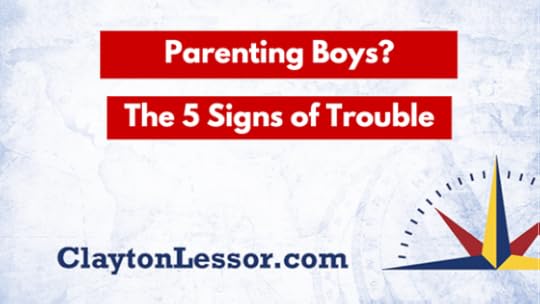
Don’t ignore the warning signs, you may think your son is just going through a phase, but that’s not always the case. Your son could be in trouble. It may be typical angst; here’s the difference?
Over the past 20 years I have helped countless troubled teens make the transition from boyhood to adult life with my program, The Quest Project.
The Warning Signs
Boys are having a hard time growing up these days. Adolescent boys are in crisis and are falling far behind their female counterparts in school and in life. They are failing to learn the lessons they need to survive and thrive in the adult world.
Here are five warning signs that your son is in trouble and what you can do about it.
Sign #1: Absent Father
You can: Get him a mentor. Whether dad is physically or emotionally unavailable, your son needs a male mentor or role model. Make sure it’s someone you both trust — an uncle, a family friend, a neighbor, a teacher, or a coach.
Sign #2: Drugs or Alcohol
You can: Get him in a treatment program. Many boys don’t know how to deal with the pain that comes with adolescence. They often turn to drugs and alcohol for relief. He may think it’s no big deal to party or rebel against your rules, but substance abuse does not make the pain go away. Get him treatment and follow up with counseling.
Sign #3: Isolating himself
You can: Get him in a support group. He needs exposer to healthy, mature and responsible men. There are various organizations to get him involved in, church groups, sports, volunteering in the community, etc. Help him find what works best for him. The goal is to interact with more people and get the support he needs.
Sign #4: Feels misunderstood: “you don’t understand what he is going through”
You can: Have this conversation. “I know things are changing for you, and that you’re no longer a little boy, and I want you to know that I can see it.” Even when he rolls his eyes at you (which he will), what matters is that he knows you validate and understand what he’s going through.
Sign #5: No sense of direction
You can: Remind him of his achievements. Honor his “unique self” and allow him to be himself; watch him soar! If he falls, help him up, brush it off and start over. Focus on the things he does well, not on what he does that is not so well. Every time he meets and exceeds your expectations, let him know you noticed. If you do this you help him build a healthy foundation and continue a path of achievement.
I believe if you keep these five signs in mind and take appropriate action you can help your son avoid “trouble.” My mission: “To create healthy lifestyles by teaching, facilitating, writing, research and example.”
Were these five signs to watch for helpful? Did I miss anything?
Author information
 Clayton Lessor
Clayton LessorClayton Lessor, PhD in education and counseling, is a Licensed Professional Counselor in private practice. He is author of “Saving Our Sons: A Parent's Guide to Preparing Boys for Success." Clay has seen over 2000 boys since 2000 and facilitated over 300 Quest Project groups. Boys attend a 10-week "boys to men program" where they and their parents will learn the tools needed to get through these turbulent teen years.
| Twitter | Facebook |
The post Parenting Boys? The 5 Signs of Trouble appeared first on Clayton Lessor.
September 19, 2017
The Quest Project-For Men

I facilitated my first The Quest Project® back in 2000. I never imagined back then that today I’d be facilitating that same program (modified for adults) to a group of men.
I have discovered The Quest Project is as meaningful to men as it is to the adolescent boys. As an example, imagine a group of six men ages 19 yrs.-64 yrs. of age coming together over a 10-week period to work through issues they feel have prevented them from being the men they want to be!
The Quest Project®-For Men
What better way for an adult male just starting out, father, brother, husband, son or uncle to understand and work on being a responsible healthy man. In some cases, I have Dad in the men’s group and son in the boy’s group-that’s compelling!
We spend 90 minutes once a week for 10 weeks to work on these processes:
how to build a safe container
goal setting and block
tools for life
wound work
anger management
conflict resolution
discovering their gift
mission=purpose
relationships
community involvement
It’s Never Too Late
You may be a young adult male that hasn’t had an important mentor and example of “how to” become a man. I see fathers, husbands, brothers and uncles that have done the best they could over the years but realize “something” is missing. Maybe they grew up in a divorced home. They didn’t get much time with their father because he worked long hours. Maybe dad was in the military and away during his son’s formative years. There are multiple reasons but the bottom line is they didn’t have a male role model to teach and provide them a rite of passage.
Now there is “immediate help and hope” for the adult male! I’m excited about the potential of bringing families closer. My mission: “to create healthy lifestyles by teaching, facilitating, writing, research and example” is my commitment I will continue to research, discover and publish examples of what I learn in my first-hand experience and intensive feedback from participants.
Are you an adult male who missed some important time with your father and would like to heal? I can help.
Author information
 Clayton Lessor
Clayton LessorClayton Lessor, PhD in education and counseling, is a Licensed Professional Counselor in private practice. He is author of “Saving Our Sons: A Parent's Guide to Preparing Boys for Success." Clay has seen over 2000 boys since 2000 and facilitated over 300 Quest Project groups. Boys attend a 10-week "boys to men program" where they and their parents will learn the tools needed to get through these turbulent teen years.
| Twitter | Facebook |
The post The Quest Project-For Men appeared first on Clayton Lessor.
September 12, 2017
Raising Boys? Helpful Tips On Identity
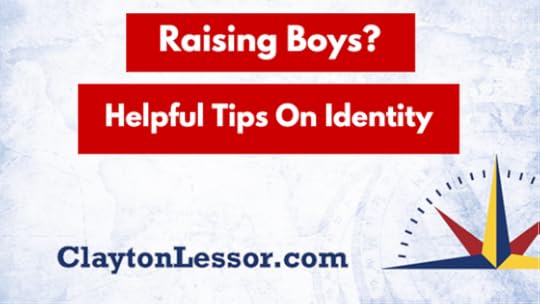
Do you know what it means to be your “authentic self?” Do you know your son’s unique “gift?”
The Gift!
Many times, I see young men that are depressed, insecure, and frankly unsure of “who” they really are. They feel no matter what they do it isn’t good enough. They are constantly trying to live up to a parent(s) expectations by being what their parent(s) wants them to be. Ask yourself, are you that parent?
One process we work through in The Quest Project® is identifying the “gift.” It’s what makes us special and unique. I’ve witnessed many young men work hard and make great progress in their search to identify their “authentic self,” which begins by knowing our gift!
They begin to contemplate “who is the man I’m going to become.” They discover just how important, gifted and unique they are. And the result is, they feel liberated!
Webster defines liberate this way:
“to free (someone or something) from being controlled by another person, group, etc. To give freedom or more freedom to someone. To take or steal something.”
That’s what happens when you allow someone to be what they’re meant to be, not try and force them to live your dream, or live the life you wish you had. I see parents all the time who are trying to live vicariously through their children, and their children are miserable as a result.
The Drift!
There is an internal feeling that boys experience very naturally as they enter adolescence, I call it “The Drift.” They begin to imagine what kind of man they’ll become. The Drift takes them towards Dad, or towards NOT Dad! To help visualize it I use this analogy:
“your adolescent son is drifting along the river in a canoe, he comes to a fork (adolescence). If he chooses left it is towards “being like dad.” If he chooses right it is not “being like dad.” What he doesn’t know or realize is there is a third choice on his journey; to continue on-straight ahead stopping the drift and choosing “his authentic self.” There he can choose the BEST STUFF and give back the negative!”
After all he is not his father but his father’s son. It’s very important as a parent to help your son be his authentic self and recognize his “gift.” Talk to your teenager and ask him what he believes is his gift-that’s where you start. He will know what it is; what he needs is for you to listen and support him.
The Right Path
Parents believe they are responsible to set their child on the right path; I couldn’t agree more IF that “path” is right for the child.
Did your parents allow you to go in the direction you wanted based on your “gift?”
My unique gift is my mission “to create healthy lifestyles by teaching, facilitating, writing, research and example.”
Author information
 Clayton Lessor
Clayton LessorClayton Lessor, PhD in education and counseling, is a Licensed Professional Counselor in private practice. He is author of “Saving Our Sons: A Parent's Guide to Preparing Boys for Success." Clay has seen over 2000 boys since 2000 and facilitated over 300 Quest Project groups. Boys attend a 10-week "boys to men program" where they and their parents will learn the tools needed to get through these turbulent teen years.
| Twitter | Facebook |
The post Raising Boys? Helpful Tips On Identity appeared first on Clayton Lessor.
September 5, 2017
Parenting Teens? Heroin Spares No One
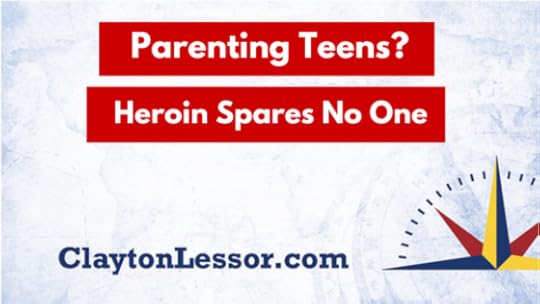
The stories are disturbing; teens addicted to and dying from heroin. It’s happening right under our nose, in our own backyard, rich and poor communities. It is pervasive, from schools to homes to the streets and parks.
The numbers are staggering. But they don’t show the complete picture.
“My Son Wouldn’t Do Drugs”
That’s the most common response I hear! Parents assume their teenager is or could be experimenting with alcohol or pot. They never imagine, in fact, it’s HEROIN or now the latest killer FENTANYL which is even stronger. Just like them I never imagined the time would come when we would say at least it’s “only alcohol or pot.”
I am an advocate for children so this message is straightforward.
This is a serious problem among our young people. My hope is that every parent will consider the very real possibility that heroin has invaded their lives. It’s the only way we can save our kids.
Parents sincerely believe that because they “experimented with drugs (pot) and with alcohol and didn’t gateway to harder drugs” that their son won’t either.
Remember these three rules:
First Rule: Drinking before age 21 is illegal. Doing drugs is illegal and both can kill you!
Second Rule: No two people are the same. Your son is not you!
Third Rule: If either parent has any addictive behavior, it increases the chances the child will become addicted!
Some Facts About Heroin
It’s cheap. Street prices are as low as $5-$10.
It’s readily available.
It’s highly addictive, because it is processed from morphine.
Heroin causes lung damage, kidney failure, heart problems and, ultimately death.
Heroin can be injected, snorted or swallowed.
Signs to watch for: tiny pupils, nodding off easily, breathing slowly and a runny nose. Additional signs are vomiting, scratching, complaints of constipation and nausea, drug sick, disinterest in appearance and wearing long sleeves (snorting or swallowing is just as popular as injecting and easier to hide).
“The Fork in the Road”
Eventually when an experimenting adolescent comes to a crossroad they have a choice to make. They don’t really want much to do with smoking pot or drinking. The other choice is chronic use and a potential gateway to harder drugs, or other addictive behavior. That’s when my experience is effective. I would recommend completion of a treatment program first; after completion, we can begin hard work on how to stay clean.
I can sometimes help with recovery. When I can identify “the wound” (traumatic event), and understand the time and space and what is going on, I can become a much needed resource for you. Your son or daughter must be part of saving themselves. It is imperative that this is put right in front of them!
Seek Help Immediately
If you suspect your teenager is using any drug or alcohol, you need to seek help immediately. Users fear the pain and sickness of withdrawal which is why they can’t stop. It is also the reason they don’t want to stop.
Are you or a loved one dealing with addiction? There is help and hope. My hope is that you will seek it out now.
Author information
 Clayton Lessor
Clayton LessorClayton Lessor, PhD in education and counseling, is a Licensed Professional Counselor in private practice. He is author of “Saving Our Sons: A Parent's Guide to Preparing Boys for Success." Clay has seen over 2000 boys since 2000 and facilitated over 300 Quest Project groups. Boys attend a 10-week "boys to men program" where they and their parents will learn the tools needed to get through these turbulent teen years.
| Twitter | Facebook |
The post Parenting Teens? Heroin Spares No One appeared first on Clayton Lessor.
August 29, 2017
Walking Tall-A Personal Journey

The Journey of a Thousand Miles
Please allow me to share my excitement and experience. I just walked for my PhD! An accomplishment that I’ve been working toward my entire life. Obstacles were abundant, but when you set a goal you just keep going until you achieve it. I did it and it feels amazing! I am officially a doctor; more specifically a Doctor of Philosophy in Education!
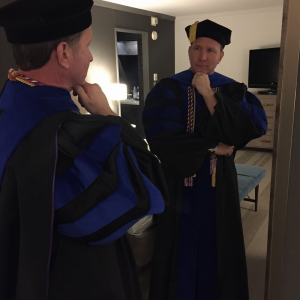
What I mean by “the journey of a thousand miles;” it’s researching, gathering data and writing a dissertation. My dissertation is titled “The Difference of a Ten Week Counselor Facilitated Adolescent Boys Group on Behavior.” Its theory comes from the work I do with boys in The Quest Project®, a mission I’ve devoted my life to.
This advanced research will be presented to the academic world with the reasons boys are struggling during adolescence and support what boys need.
I’ll be honest, there were moments when I wished a University had awarded me an “honorary doctorate” because I could have added years to my life! But that’s not who I am.
My Journey
Made sense of my own suffering in childhood through therapy.
Discovered my life mission by understanding my gift.
Obtained a Psychology degree and focused on adolescent boys with developmental needs.
Became a licensed counselor with a Master’s Degree and wrote a thesis on adolescent boys.
Developed The Quest Project®-A Modern Day Rite of Passage with years of success (2000 graduates since 2000).
Written and published a book “Saving Our Sons-A Parent’s Guide to Preparing Boys for Success.”
Completed my Doctorate Degree on scientific theory supporting what adolescent boys need.
I am spreading the word and advancing the science behind what I do; I am giving adolescent boys the very best of what they need to be healthy young men. I have given over 25 years of my life to this work.
I’m now writing “Saving Our Sons 2″- For Dads.” Look for it to launch early 2018.
I am “proof” if you work hard and don’t give up you can reach your goals! Have you set goals for yourself, share your accomplishments!
Author information
 Clayton Lessor
Clayton LessorClayton Lessor, PhD in education and counseling, is a Licensed Professional Counselor in private practice. He is author of “Saving Our Sons: A Parent's Guide to Preparing Boys for Success." Clay has seen over 2000 boys since 2000 and facilitated over 300 Quest Project groups. Boys attend a 10-week "boys to men program" where they and their parents will learn the tools needed to get through these turbulent teen years.
| Twitter | Facebook |
The post Walking Tall-A Personal Journey appeared first on Clayton Lessor.
August 22, 2017
An Unexpected Blessing

I admit I like to share a good story! This is one that warmed my heart.
For most of us going to the grocery store is a necessity We’re out of milk or need something for dinner! In other words, we don’t do it for fun! This week I witnessed something truly awesome while standing in line to check out.
A Blessing Right Before My Eyes
The “bagger,” I’ll call him “Joe,” is a middle aged man and Joe was bagging groceries for the customer in front of me. It was a Mom and son and I’m guessing the boy was 11 or 12 years old. I listened in as Joe began making conversation with the boy.
Joe asked him if he’d started school yet. The boy replied, “no but his first day is tomorrow.” Joe said, “I bet you’re excited to get back to school, and I bet you’re good in school!” The boy nodded yes with a smile. Joe kept it going and asked, “Do you play sports, you look like a sports guy.” Again with a smile, the boy said yes that he liked lots of sports. Joe responds “I bet you’re great at sports, you stay with it maybe you’ll get a scholarship someday!” Imagine the big smile this boy had!
As they walked away Joe said this “you do good, my man, you’re a fine young man!”
I thought about this interaction all day. More importantly, I know the young boy did too! I don’t remember ever hearing (I think it was more eavesdropping) such an awesome conversation. And I ask you, why don’t we do more of this? Boys need to be engaged exactly this way. Joe made a difference in a young man’s life-WAY TO GO JOE!
My Personal Challenge
I personally take the time to bless a younger person at least once a day.
Do you? Do you tell your son he’s done something good or simply that he’s loved and you’re glad he’s your son?
Pulitzer Prize winner Robert Bly, author of “Iron John” and “The Sibling Society” said it like this “We do our young men a disservice by not blessing them. So each of us young or old needs to bless a younger man each day.”
Be a mentor to a young man who doesn’t have a role model in his life. Or for that matter, a boy can never have too many so BE A MENTOR. Together we can make a difference.
My mission: “To create healthy lifestyles by teaching, facilitating, researching, writing, and example.”
Author information
 Clayton Lessor
Clayton LessorClayton Lessor, PhD in education and counseling, is a Licensed Professional Counselor in private practice. He is author of “Saving Our Sons: A Parent's Guide to Preparing Boys for Success." Clay has seen over 2000 boys since 2000 and facilitated over 300 Quest Project groups. Boys attend a 10-week "boys to men program" where they and their parents will learn the tools needed to get through these turbulent teen years.
| Twitter | Facebook |
The post An Unexpected Blessing appeared first on Clayton Lessor.
August 15, 2017
Raising Sons? Discipline vs Punishment
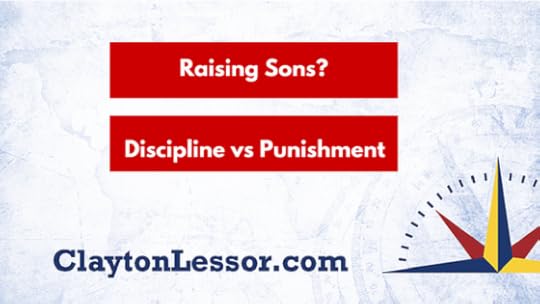
Discipline or Punishment?
What’s the difference you ask! There’s a big difference between discipline and punishment.
Punishment.
So your son has broken the rules; he’s been caught drinking or smoking, maybe a bad report card? You have to do “something,” he’ll have to be punished. The way to stop a child from misbehaving is to cause some kind of pain right? This usually means “grounding” a boy or taking away privileges like cell phones, video games, and other toys.
And guess what? That doesn’t work!
Punishment doesn’t work because it isn’t about your boy. It’s about instant gratification for you. You feel bad and want to convey your disappointment. You make him feel bad; you feel your job is done. He doesn’t learn anything from this experience. What he learns is fear he can get caught, and that’s not a lesson. It can actually make the behavior worse, pushing it underground and teaching him to become a better liar, sneaker, or just better at finding ways to not get caught.
So, if punishment doesn’t work and you’re not supposed to ignore bad behavior, what option is left?
Discipline!
Taking things away or grounding is not discipline. Discipline and punishment are two different things. The word discipline, from the root word discere, means “to learn.” When you discipline, the goal is not to inflict physical or emotional discomfort, but to teach something by employing something we call natural consequences.
The natural consequence is when something automatically happens as a result of something else happening (like a sunburn when you choose not to wear sunscreen). Your job as a parent is to create natural consequences that will deliver those lessons.
This can be a hard concept for parents to grasp, but it’s actually easy to do. Sit down with your son, lay down the rules of the house (in advance) and tell him this, “These are the rules. If you follow these rules, you get to do what you want, within reason.”
Next important part. Ask your child, “What is it that you want?”
He’s probably got a long list! The way natural consequences work is, as long as your son follows the rules you’ve established in advance, he gets to do and have those things (within reason and provided they’re age-appropriate and you approve).
You don’t punish or take anything away. Your son now knows he can choose to have what he wants, or to not have what he wants. That takes you out of the way. Making it all about you and not your son is what gets everybody in trouble. Giving your child responsibility for his behavior may not sound like an earth-shattering concept, but it’s actually a big deal.
How It Works
Setting up natural consequences lets him feel his power. It puts him in control of outcomes. He’ll reach a point where he’s tempted to step the wrong way and suddenly remember, “Oops, I should have made a right instead of a left, now I have consequences for that.” It’s not about getting caught by mom or dad, it’s about making a conscious choice to step in the right direction. It’s about learning the rules, and that if he keeps doing what he’s doing, he’ll get more of what he wants. As he keeps stepping into his power over the years, he’ll grow into a healthy, confident man.
Isn’t that exactly what you want?
Natural consequences are incredibly effective. When you’re establishing them for the first time, don’t forget your son’s attention span. Drone on for more than five minutes and he may forget 90% of what you say. Instead, make it visual and physical. Use whiteboards, use charts, anything that allows him to visually track his progress/success or shortfalls. It eliminates begging you for things he wants, all he has to do is look at the chart to see if he’s earned it. Boys respond well to that visual and physical effect, because the visual itself is rewarding.
Rewarding—not punishing—is the most effective kind of discipline.
Want more on this subject? Watch for my next book due out early 2018-I dedicate an entire chapter to this topic! In the meantime, feel free to post your questions or comments to my Facebook page.
Author information
 Clayton Lessor
Clayton LessorClayton Lessor, PhD in education and counseling, is a Licensed Professional Counselor in private practice. He is author of “Saving Our Sons: A Parent's Guide to Preparing Boys for Success." Clay has seen over 2000 boys since 2000 and facilitated over 300 Quest Project groups. Boys attend a 10-week "boys to men program" where they and their parents will learn the tools needed to get through these turbulent teen years.
| Twitter | Facebook |
The post Raising Sons? Discipline vs Punishment appeared first on Clayton Lessor.



